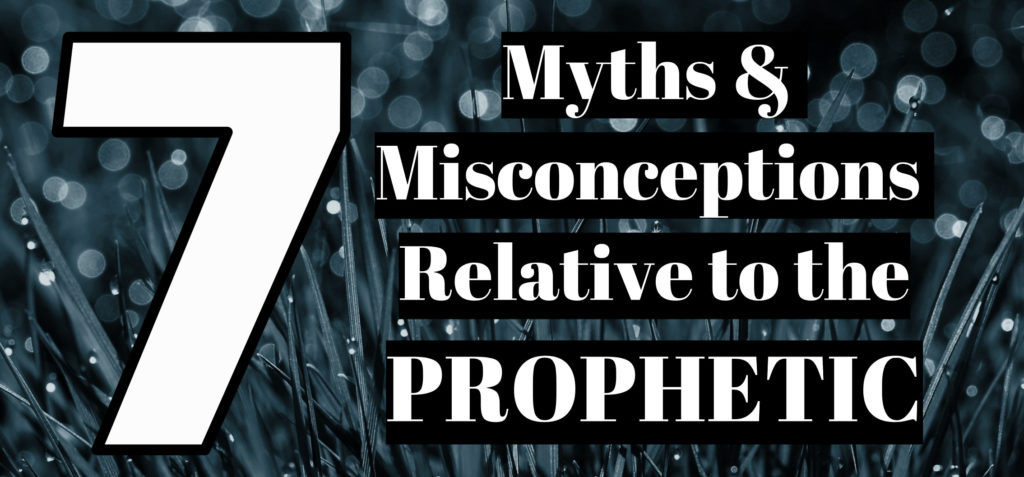
Seven Myths & Misconceptions Relative to the Prophetic Pt. 2
Myth #4: Corrective prophecies are to be given solely by mature prophets and leaders.
Closely connected to the previous two myths is the popular belief that prophecies given by ascension gift prophets are less restricted and broader in scope than general prophecies given by regular believers (who are not prophets). According to this erroneous belief, God only trusts correction to the wise and mature, thus restricting corrective prophecies or revelation to an exclusive few. But this type of limited view and restriction pertaining to corrective prophecies, or even correction in general, is completely absent from the biblical canon.
Nowhere in Scripture does God limit correction to the wise or the mature. There is no argument that these may be the best qualified, but the truth of the matter is that God will use anyone and anything to bring correction when necessary.
For example, God once used a dumb ass to rebuke a spiritually blind and internally corrupt prophesier named Balaam for his madness (2 Pet. 2:16 KJV; Num. 22:28-33). If God could use a “dumb ass” to rebuke a stubborn “prophet” (or rather, soothsayer), surely, He can use anyone to rebuke you. Furthermore, the fact that a “dumb ass” was qualified and appointed by God to deliver a corrective word to a reputable prophesier named Balaam means that mature wisdom is not a prerequisite for giving spiritual correction.
By the mouth of two or three witnesses every word shall be established, so here’s another example (2 Cor. 13:1). When the prophet Samuel was still a young boy serving under Eli, having never before heard the voice of God in his life and so spiritually immature that he was unable to distinguish the voice of God from the voice of man, God delivered a scathing rebuke against Eli and his household—the established priests and religious rulers of that time. God not only gave Samuel the revelation, He allowed him to deliver this harsh message to his leader, mentor, and spiritual father, Eli (1 Sam. 3:1-18). The boy, Samuel, was lacking in both wisdom and spiritual maturity, yet God used him to deliver a corrective word of judgment against an entire religious order, including its presiding leader. The biblical evidence is clear—corrective prophecies can be delivered by anyone!
Myth #5: The major purpose and activity of a prophet is to give personal prophecies.
It was the late Dr. Myles Munroe who once wrote: “When the purpose of a thing is not understood, abuse in inevitable!” What a profound statement! It is purpose that defines the clear boundaries of function and provides precise direction for all forward movement and activity. Thus, without a clear, true, and accurate understanding of purpose, activity is dictated by human desire or demand, resulting in vain or meaningless (purposeless) activity and dysfunction.
The fact that personal prophecy has been elevated to the level of importance that it has, being heralded and propagated as the greatest defining characteristic of a prophet (as far as his ability to prophesy), while being ascribed the ultimate place of importance with regard to “prophetic” ministry today, is a clear and unmistakable sign of the movement’s error and dysfunction. This is nothing more than the tail wagging the dog, because as far as Scriptural and historical precedence is concerned, personal prophecy—or the ability to prophesy to certain individuals—is the lowest and most elementary aspect of prophetic ministry.
It is often stated that up to one-third of the Bible is prophecy. Actually, according to most reputable authorities, it is less than one-third and amounts to around twenty-seven percent of the Bible. However, a careful study of the prophets’ writings and ministry in Scripture reveals that a very tiny and insignificant fraction of the Bible’s twenty-seven percent prophecy can be categorized as “personal prophecy.” For example, John the Baptist, proclaimed by Jesus to be the greatest prophet born of a woman, and who proclaimed many great and profound truths, did not deliver a single personal prophecy (Matt. 11:11). The closest thing to a personal prophecy, as far as John the Baptist was concerned, was a personal reproof to Herod for his immoral marriage to Herodias (Luke 3:19). Similarly, Jesus was the greatest prophet who ever lived and the embodiment of the ultimate prophetic dimension, yet of the scores of prophecies given by Jesus throughout His three and one-half years of ministry, it would be difficult (or debatable)—if not impossible—to classify any one of them as a “personal prophecy” (and that includes Jesus’s ministry to the woman at the well). Even Moses, who was the prophet par excellence of the Old Testament, has no personal prophecies recorded under his name, unless you include God’s words of judgment to Pharaoh of Egypt and the divine command to “Let My people go! (Ex. 9:1)”
The point I’m making here is that personal prophecy occupies a very small and often insignificant place in Scripture, especially as it pertains to the prophet’s ministry and function. It doesn’t matter if the prophet was Elijah, Elisha, Jeremiah, Isaiah, or any of the long list of prophets recorded in Scripture, the findings are the same. Personal prophecy is perhaps the least important aspect of a prophet’s ministry. This doesn’t make it worthless or unnecessary; it just means that it is seldom of great importance insofar as it pertains to the prophet’s overall purpose and mission, or even to the prophetic dimension as a whole. We can’t afford to major on the minors or ascribe great importance to the things that are least important. And no matter how popular a notion is, we must allow Scripture to dictate what is true.
Pastors and church leaders who overemphasize this aspect of the prophet’s ministry when inviting prophets to their churches/meetings do themselves and their congregations a great disservice. No community of believers (church) will ever be built up and established in a mature and accurate prophetic dimension by placing undue emphasis on personal prophecy. There are much greater and profound things that the prophet has to deposit and impart than just a personal prophetic word.
Myth #6: Dreams and dream interpretation are important aspects of prophetic ministry
The subject of dreams and dream interpretation has become increasingly popular today in Christian circles, especially amongst those who identify themselves as being “prophetic.” Several recognized and respected leaders within the prophetic movement have even written books on the subject. Others have incorporated it into their “prophetic” training programs, ascribing great importance to the practice as it pertains to prophetic ministry. Because this can be somewhat of a sensitive subject for some believers, and because debunking such a myth requires a more thorough and exegetical approach to the subject of dreams and dream interpretation, I must refer you to our book, Prophetic Divergence: Distinguishing Characteristics of the Third Prophetic Dimension, where this subject is given the attention it deserves.
Let me be clear—the issue here isn’t whether dreams are a legitimate form of divine communication. Scripture is very clear that they are. The issue isn’t whether prophets can receive and/or interpret dreams. Scripture is very clear on this also. The issue is whether dreams should occupy a significant or important part of the prophetic, and whether dream interpretation by the use of dream books and/or dictionaries of symbolism are legitimately sanctioned by Scripture. Scripture issues an emphatic no on both counts!
Consider this, of the dozens of (true) prophets mentioned in Scripture, only two are specifically identified with the dream phenomena and the ability to interpret them. Furthermore, these same two individuals—Joseph and Daniel—were in captivity or exile within foreign (pagan) nations, where dreams were ascribed much greater importance and value than in Israel. In traditional Hebraic culture, dreams were not as highly regarded or valued. As a matter of fact, if you were to remove the Joshua and Daniel narratives contained in Genesis and Daniel from Scripture, passages describing dreams and dream interpretation would be almost non-existent. Again, you need to read the book to understand the full context, but the point here is that, from a biblical perspective, dreams (and the interpretation thereof) have never been an important aspect of the prophetic. Even when they are introduced, dream books and/or dictionaries of symbolism are never employed in their interpretation. And in the New Testament, after the birth of God’s Covenant Kingdom Community (Church), dreams disappear altogether.
Myth #7: There is a significant difference between prophets and seers
It has become a commonly held belief among many in the prophetic movement today that prophets are distinct from seers. According to this myth, prophets receive their revelation primarily from a “bubbling forth” or ecstatic unction that proceeds from their innermost being as they open their mouths to prophesy in faith. They are inspired speakers. Seers, on the other hand, are more visionary and receive their revelation primarily through visions. They are anointed to see. This would seem plausible, especially considering the fact that some (mostly outdated) Hebrew lexicons or dictionaries interpret the words prophet (nâbı̂y’) and seer (râ’âh) in a similar fashion as described above. There’s just one problem—it isn’t true!
New scholarly evidence regarding the Hebrew words in question now disproves this false dichotomy between prophets and seers. This lengthy evidence is provided and explained in detail in our new book, Prophetic Divergence: Distinguishing Characteristics of the Third Prophetic Dimension. If you still need convincing, or even if you’re already convinced, you need to get a copy of this very important book. As a side note, this book has been mentioned several times throughout this article, not as a boastful or promotional plug but as a recommended apologetic resource for the truths we are trying to convey through this series. It is impossible to give these issues the treatment they deserve in a short series of articles, thus the reason the book was written and published.
Back to the subject at hand. Even if you were to disregard the new scholarly evidence regarding the Hebrew words for prophet and seer, you cannot disregard the Scriptural usage and context with regard to how the terms are used. Scripture is explicitly clear that he who is now called a prophet was formerly called a seer in Israel (1 Sam. 9:9). It couldn’t be any clearer than that. The prophet and the seer are one and the same, the main difference being terminology and not necessarily function. The idea that seers receive their revelation differently from prophets and that they are more visionary in their experience is a baseless assumption rooted in exegetical error and a misunderstanding of the Hebrew words. But again, don’t just take our word for it; examine the evidence for yourself.

Leave A Comment